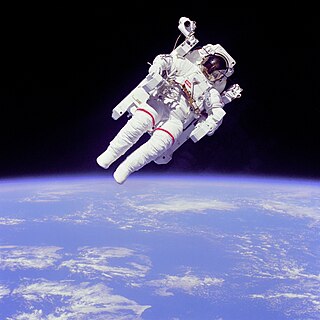
An astronaut is a person trained, equipped, and deployed by a human spaceflight program to serve as a commander or crew member aboard a spacecraft. Although generally reserved for professional space travelers, the terms are sometimes applied to anyone who travels into space, including scientists, politicians, journalists and tourists.
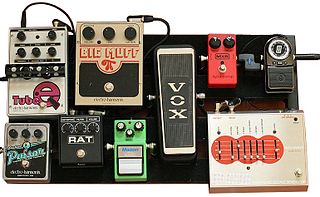
An effects unit or effects pedal is an electronic device that alters the sound of a musical instrument or other audio source through audio signal processing.
HAL 9000 is a fictional artificial intelligence character and the main antagonist in Arthur C. Clarke's Space Odyssey series. First appearing in the 1968 film 2001: A Space Odyssey, HAL is a sentient HAL/AL 9000-series computer that controls the systems of the Discovery One spacecraft and interacts with the ship's astronaut crew. While part of HAL's hardware is shown toward the end of the film, he is mostly depicted as a camera lens containing a red or yellow dot, instances of which are located throughout the ship. HAL 9000 is voiced by Douglas Rain in the two feature film adaptations of the Space Odyssey series. HAL speaks in a soft, calm voice and a conversational manner, in contrast to the crewmen, David Bowman and Frank Poole.
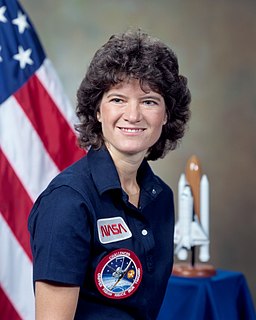
Sally Kristen Ride was an American astronaut and physicist. Born in Los Angeles, she joined NASA in 1978, and in 1983 became the first American woman in space. She was the third woman in space overall, after USSR cosmonauts Valentina Tereshkova (1963) and Svetlana Savitskaya (1982). Ride remains the youngest American astronaut to have traveled to space, having done so at the age of 32. After flying twice on the Orbiter Challenger, she left NASA in 1987.

A guitar amplifier is an electronic device or system that strengthens the weak electrical signal from a pickup on an electric guitar, bass guitar, or acoustic guitar so that it can produce sound through one or more loudspeakers, which are typically housed in a wooden cabinet. A guitar amplifier may be a standalone wood or metal cabinet that contains only the power amplifier circuits, requiring the use of a separate speaker cabinet–or it may be a "combo" amplifier, which contains both the amplifier and one or more speakers in a wooden cabinet. There is a wide range of sizes and power ratings for guitar amplifiers, from small, lightweight "practice amplifiers" with a single 6" speaker and a 10 watt amp to heavy combo amps with four 10” or four 12" speakers and a powerful 100 watt amplifier, which are loud enough to use in a nightclub or bar performance.

Wing Commander Rakesh Sharma, AC is a former Indian Air Force pilot who flew aboard Soyuz T-11 on 3 April 1984 with the Soviet Interkosmos programme. He is the only Indian citizen to travel in space, although there have been other astronauts with an Indian background who were not Indian citizens.

STS-59 was a Space Shuttle program mission that took place in 1994. The launch was chronicled by the 1994 Discovery Channel special about the Space Shuttle program.

Major Tom is a fictional astronaut mentioned in David Bowie's songs "Space Oddity", "Ashes to Ashes", "Hallo Spaceboy", and "Blackstar". Bowie's own interpretation of the character evolved throughout his career. "Space Oddity" (1969) depicts an astronaut who casually slips the bonds of the world to journey beyond the stars. In the song "Ashes to Ashes" (1980), Bowie reinterprets Major Tom as an oblique autobiographical symbol for himself. Major Tom is described as a "junkie, strung out in heavens high, hitting an all-time low". This lyric was interpreted as a play on the title of Bowie's album Low (1977), which charted his withdrawal following his drug abuse in the United States. Additionally, the choked and self-recriminating tone used in the lyrics "Time and again I tell myself I'll stay clean tonight." reinforces an autobiographical and retrospective interpretation. A short time later, there is another reversal of Major Tom's original withdrawal, turning 'outwards' or towards space.

2001: A Space Odyssey is a 1968 science fiction novel by British writer Arthur C. Clarke. It was developed concurrently with Stanley Kubrick's film version and published after the release of the film. Clarke and Kubrick worked on the book together, but eventually only Clarke ended up as the official author. The story is based in part on various short stories by Clarke, including "The Sentinel". By 1992, the novel had sold three million copies worldwide. An elaboration of Clarke and Kubrick's collaborative work on this project was made in the 1972 book The Lost Worlds of 2001.
"Planet Caravan" is a song by the English heavy metal band Black Sabbath. It was originally released on their 1970 album Paranoid.

Sunita Lyn Williams is an American astronaut and United States Navy officer who formerly held the records for most spacewalks by a woman (seven) and most spacewalk time for a woman. Williams was assigned to the International Space Station as a member of Expedition 14 and Expedition 15. In 2012, she served as a flight engineer on Expedition 32 and then commander of Expedition 33.

The Great Divide is the debut album by the progressive metal group Ice Age, released in 1999.

Amplifier are an English rock band originating from Manchester. The band has released six albums and four EPs since its inception in 1999. Their music has been described as "Soundgarden, Tool, Black Sabbath, Oceansize and Pink Floyd taking copious amounts of mind-altering substances and venturing on a trip through time and space, and back again." Their music is characterised by guitarist Sel Balamir's effect pedals, Matt Brobin's complex drumming, extended heavy sections, atmospheric compositions and philosophical lyrics.
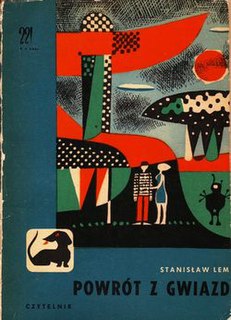
Return from the Stars is a science fiction novel by Polish author Stanisław Lem. Written in 1961, it is the story of a cosmonaut returning to his homeworld, Earth, after more than a century in Earth time, but just 10 years for him, finding it a completely different place, with many developments he dislikes. The novel touches the ideas of social alienation, culture shock and dystopia. It was first translated into English in 1980 by Barbara Marszal and Frank Simpson.
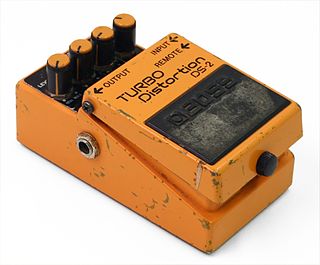
Distortion and overdrive are forms of audio signal processing used to alter the sound of amplified electric musical instruments, usually by increasing their gain, producing a "fuzzy", "growling", or "gritty" tone. Distortion is most commonly used with the electric guitar, but may also be used with other electric instruments such as electric bass, electric piano, and Hammond organ. Guitarists playing electric blues originally obtained an overdriven sound by turning up their vacuum tube-powered guitar amplifiers to high volumes, which caused the signal to distort. While overdriven tube amps are still used to obtain overdrive, especially in genres like blues and rockabilly, a number of other ways to produce distortion have been developed since the 1960s, such as distortion effect pedals. The growling tone of a distorted electric guitar is a key part of many genres, including blues and many rock music genres, notably hard rock, punk rock, hardcore punk, acid rock, and heavy metal music, while the use of distorted bass has been essential in a genre of hip hop music and alternative hip hop known as "SoundCloud rap".
The Marshall Bluesbreaker is the popular name given to the Models 1961 and 1962 guitar amplifiers made by Marshall from 1964/65 to 1972.
The White amplifier was an instrument amplifier made by the Fender company, named for Fender's production manager Forrest White and designed as a surprise by Leo Fender for his longtime associate. It was sold together with the matching steel guitar and was made from 1954 until 1962. Approximately 1,500 copies were made. The amp was nearly identical to the 5F2 Princeton circuit, but was made under the White production name, probably "to get more inexpensive amps and steels into the market without offending authorized Fender dealers." The amplifier was not in fact white, but had blue-gray linen tweed, dark blue grill cloth, and blue dyed leather handles.

The United States Spacecraft Discovery One is a fictional spaceship featured in the first two novels of the Space Odyssey series by Arthur C. Clarke and in the films 2001: A Space Odyssey (1968) directed by Stanley Kubrick and 2010: The Year We Make Contact (1984) directed by Peter Hyams. The ship is a nuclear-powered interplanetary spaceship, crewed by two men and controlled by the AI on-board computer HAL 9000. The ship is destroyed in the second novel and makes no further appearances.
Gaganyaantransl. "Sky Craft") is an Indian crewed orbital spacecraft intended to be the formative spacecraft of the Indian Human Spaceflight Programme. The spacecraft is being designed to carry three people, and a planned upgraded version will be equipped with rendezvous and docking capability. In its maiden crewed mission, Indian Space Research Organisation (ISRO)'s largely autonomous 3.7 t (8,200 lb) capsule will orbit the Earth at 400 km (250 mi) altitude for up to seven days with a two or three-person crew on board. The crewed vehicle was originally planned to be launched on ISRO's GSLV Mk III in December 2021, but this has since been delayed to no earlier than 2023. This Hindustan Aeronautics Limited (HAL) manufactured crew module had its first un-crewed experimental flight on 18 December 2014. As of May 2019, design of the crew module has been completed. Defence Research and Development Organisation (DRDO) will provide support for critical human-centric systems and technologies like space grade food, crew healthcare, radiation measurement and protection, parachutes for the safe recovery of the crew module and fire suppression system.
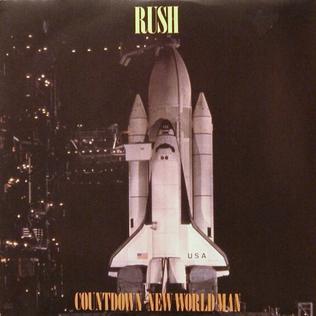
"Countdown" is a song by Rush from their 1982 album Signals. Its lyrics are about the first launch of the Space Shuttle Columbia the previous year. The song incorporates audio from voice communications between astronauts John Young and Robert Crippen and ground control, specifically Ascent CAPCOM Daniel C. Brandenstein and with commentary from Hugh Harris, Kennedy Space Center Public Affairs Officer, leading up to the launch through to LOS just after Press to Rota.
We met our liaison man, who conducted us safely into the "V.I.P." zone in the pre-dawn hours. We were due to play that night in Dallas, so we couldn't wait much longer. Finally they announced that the launch would be scrubbed for that day. Well, we ran for the car, and our daring driver sped off, around the traffic jams, down the median of the highway, and got us to the airport barely in time.
The next night we had a show in San Antonio, after which we drove off immediately, clambered into a hired jet, and flew straight back to Florida. This time the launch took place on schedule, and it was SOMETHING!!
I remember thinking to myself as we flew back to Fort Worth after a couple days without sleep: "We've got to write a song about this!" It was an incredible thing to witness, truly a once-in-a-lifetime experience. I can only hope that the song comes even close to capturing the excitement and awe that we felt that morning.
— Neil Peart in the Signals tour book.













